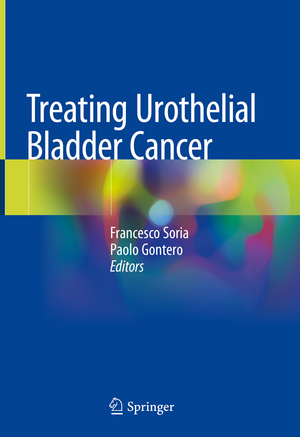Treating Urothelial Bladder Cancer
Editat de Francesco Soria, Paolo Gonteroen Limba Engleză Hardback – 23 aug 2018
Treating Urothelial Bladder Cancer is particularly relevant to urologists, oncologists, and radiotherapists, but is also applicable to practitioners, geriatricians, and public health managers due to its multidisciplinary approach to bladder cancer management.
| Toate formatele și edițiile | Preț | Express |
|---|---|---|
| Paperback (1) | 330.02 lei 38-44 zile | |
| Springer International Publishing – 26 dec 2018 | 330.02 lei 38-44 zile | |
| Hardback (1) | 351.82 lei 38-44 zile | |
| Springer International Publishing – 23 aug 2018 | 351.82 lei 38-44 zile |
Preț: 351.82 lei
Preț vechi: 370.34 lei
-5% Nou
Puncte Express: 528
Preț estimativ în valută:
67.32€ • 70.48$ • 55.70£
67.32€ • 70.48$ • 55.70£
Carte tipărită la comandă
Livrare economică 01-07 aprilie
Preluare comenzi: 021 569.72.76
Specificații
ISBN-13: 9783319785585
ISBN-10: 3319785583
Pagini: 133
Ilustrații: VIII, 133 p. 25 illus., 18 illus. in color.
Dimensiuni: 178 x 254 mm
Greutate: 0.54 kg
Ediția:1st ed. 2018
Editura: Springer International Publishing
Colecția Springer
Locul publicării:Cham, Switzerland
ISBN-10: 3319785583
Pagini: 133
Ilustrații: VIII, 133 p. 25 illus., 18 illus. in color.
Dimensiuni: 178 x 254 mm
Greutate: 0.54 kg
Ediția:1st ed. 2018
Editura: Springer International Publishing
Colecția Springer
Locul publicării:Cham, Switzerland
Cuprins
Preface.- Part I: Bladder cancer diagnosis.- Imaging and bladder cancer: can we do better?.- Optical improvements in bladder cancer diagnosis: seeing better for a better management.- Enhancing the quality of transurethral resection: the importance of a complete TURB and the en-bloc resection.- Active surveillance for low risk non-muscle invasive bladder cancer.- Part II: Non-muscle invasive bladder cancer.- How good we are to predict the outcomes of non-muscle invasive bladder cancer?.- Adjuvant treatment: old and new immunotherapy in non-muscle invasive bladder cancer.- The role of new experimental conservative therapies for high risk non-muscle invasive bladder cancer. Could we trust them?.- Part III: Muscle invasive bladder cancer.- Is there still a role for radical cystectomy?.- Minimally invasive radical cystectomy and its role in the treatment of bladder cancer patients. Myth or reality?.- Neoadjuvant vs adjuvant chemotherapy: which is right?.- Radiotherapy for the treatment of muscle invasive bladder cancer.- Immunotherapy and new combinations.- Part IV: A view on the future.- The role of urologist.- The role of pathologist.- The role of medical oncologist.- The role of radiotherapist.
Recenzii
“Each topic is explained clearly, well illustrated, and comprehensively referenced to the current evidence. … I strongly recommend this book to everyone involved in the care of bladder cancer.” (Jay Khastgir, urologynews, urologynews.uk.com, September 1, 2019)
Notă biografică
Paolo Gontero is Associate Professor of Urology at the University of Torino, Italy and currently Chairmen of the Division of Urology, San Giovanni Battista Hospital, Torino, Italy. His main clinical interests are Oncology Urology Surgery, Laparoscopic and Robotic kidney and prostate oncological surgery and Reconstructive Urology. He has authored and co-authored more than 200 publications on international journals.
Francesco Soria is Consultant Urologist at University of Vienna (Urologist, MD, FEBU).
Francesco Soria is Consultant Urologist at University of Vienna (Urologist, MD, FEBU).
Textul de pe ultima copertă
This book aims to bring together the current research and discussions surrounding bladder cancer management. New technologies and therapeutic agents have become increasingly effective at treating urothelial bladder cancer and have created a range of opportunities to change the ways in which the disease is treated. Chapters cover the changes in adjuvant treatment, confocal laser endomicroscopy, and the roles of oncologists, pathologists, and radiotherapists in managing bladder cancer.
Treating Urothelial Bladder Cancer is particularly relevant to urologists, oncologists, and radiotherapists, but is also applicable to practitioners, geriatricians, and public health managers due to its multidisciplinary approach to bladder cancer management.
Caracteristici
Focuses on the newest aspects of bladder cancer management Features clinical cases in each section Covers many controversial aspects of the field
